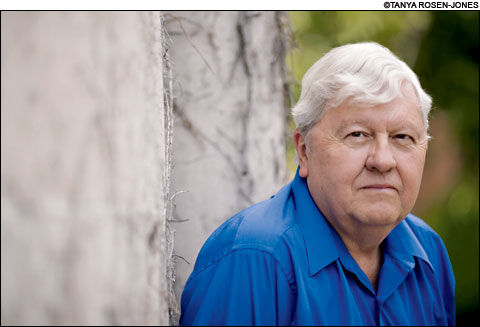
LEAD AND FOLLOW Poetry so deeply engages Young that, like a good athlete, he could drop his tennis racquet and kick a soccer ball without skipping a beat. |
David Young's Selected and New Poems is a good book by a good poet. You'll have to take my word for that, because I am not going to quote from his poems. The reason is that he is a poet of sequences. Of course, there are fine lines in his poetry and entire quotable passages, but neither lines nor passages demonstrate how his poems develop, their breadth (even in relatively short poems), and the twists and turns, the journeys, they take.
I have known Young as a translator of Chinese. If David Hinton is at one end of the scale of American translators of Chinese, then Young is at the other. Young's translations are what most readers expect: clear syntax and development that relies on visual imagery. Hinton has the deeper background in Chinese history and religion. His translations break with what those of us who, like myself, do not read Chinese think of as classical Chinese poetry. If Young is smooth, Hinton feels rough. One day I turn to Young's translations, the next to Hinton's.
In his own language, Young writes clearly and with confidence. He is undeterred by thoughts of whether the world needs another poem, and he is free of self-conscious tics. His poems flow gracefully one after the other, and if this makes for a certain sameness in tone over the long haul of this volume, who reads a volume of selected poetry in order, cover to cover? Not I. Not even if the book is by an old and dear friend. Early, middle, and late is a sort of tyranny for poets. If not a tyranny, then a convention that I happily avoid by reading back and forth with torn bits of paper marking poems I've especially liked.
What are Young's subjects? Poetry, for one, but whatever theories he has are represented in practice. He writes a sequence of ghazals, one of prose poems, another of sonnets, and one based on the alphabet. His poetry has no grand design but a series of small designs, prolongations of form and feeling that allow him to pursue the various literary subjects — Basho to Henry Vaughan — and the vagaries of life as he has experienced them. One of his most beautiful sequences is "Nine Deaths," his elegy for his wife. He has a gift for writing about those closest to him and a talent for the paradox of lead and follow. It can be said of some poets that their poetry is one long poem. Young's poems are open-ended but embracing. They want to go as far as they can and then end. Poetry so deeply engages him, you feel that, like a good athlete, he could drop his tennis racquet and kick a soccer ball without skipping a beat.